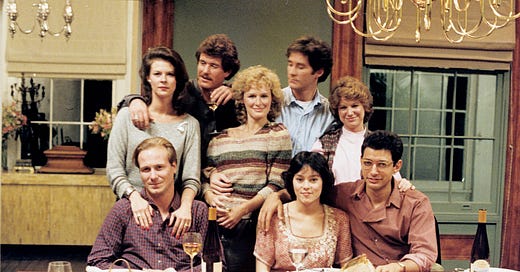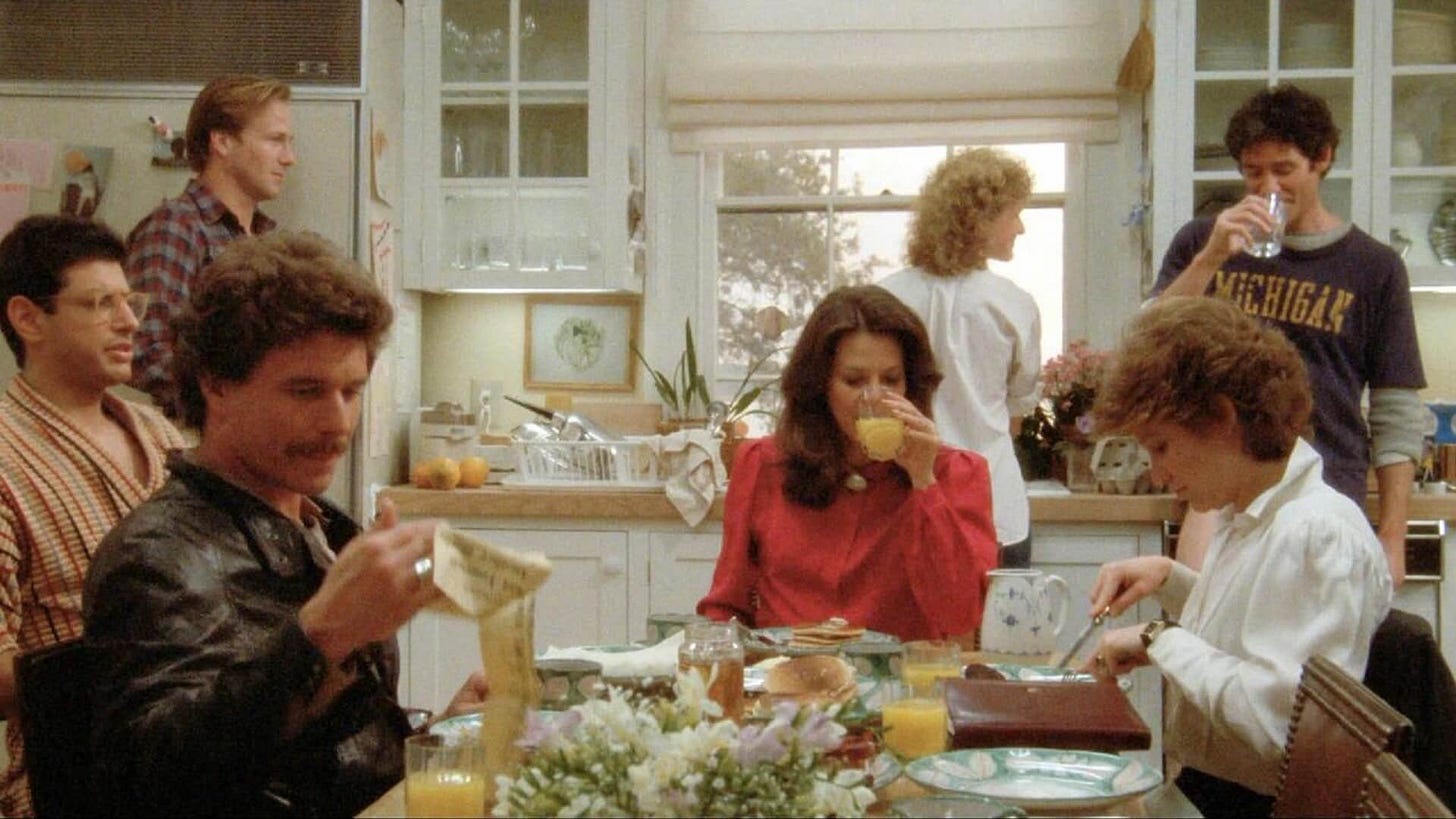When I was a kid, I was obsessed with the ‘60s. In sixth grade, a teacher asked us all, if we could go any place and time in history, where would it be? I answered immediately, “Woodstock.” I idealized the era because that’s where my parents came from. I spent hours on the floor as a child going through my mother’s records: Phil Ochs, Carole King, Bob Dylan. I remember how mystified I was by The Beatles’ White Album. Who would buy an album with no cover? Then I opened it up and saw that insert with portraits of each Beatle, and I couldn’t stop staring at their faces.
When I got older, I heard the narrative about how all the hippies sold out and went to work on Wall Street, and I was mad at them for a long time. I felt like they had let the world down. Then I got even older and realized that most of the hippies probably weren’t that committed in the first place. They were just down with the free love and good vibes. It was a “fashion,” as Glenn Close worries aloud in The Big Chill, but then again, so was Wall Street. It’s fun to dream about changing the world, but you’re probably not going to. It’s far smarter to go with the flow, even if you hate yourself for it.
This is what The Big Chill is about. It concerns a group of friends who once marched on Washington and, as they reunite in the ‘80s to mourn a departed member of their little group, are all in the process of abandoning their principles in the hopes of becoming a little more comfortable. One built a shoe company from the group up and is about to sell it to Nike. Another wanted to author the Great American Novel but instead writes puff pieces for People Magazine. An aspiring social justice lawyer became a defense attorney. A poet became a rich housewife.
At least they’re conflicted about it. Over the course of a weekend, they wrestle with their guilt and estrangement—did they lose their principles because they fell out of touch with each other, or was it the other way around—and ultimately decide that love is still the answer, even if its definition has changed a little.
The Big Chill isn’t talked about among the great films of the 1980s, even though its charms are undeniable, and the degree of difficulty is off the charts. Ensemble movies are hard to pull off, especially when they’re just about people and not centered around a heist or military mission or something. But writer-director Lawrence Kasdan nails it with a script that elucidates the inner lives of its characters through their behavior towards each other, while giving them enough zingers to keep things breezy and demonstrate the way people use humor to fend off their darkest, most intrusive thoughts. The cast, which includes budding stars Close, Kevin Kline, William Hurt, and Jeff Goldblum, forges an indelible chemistry. From the cast to the crew, it’s a film in which everyone seems to be pulling in the same direction.
It was a hit that was nominated for Best Picture, so what happened to its reputation? I think the problem is that people hate Boomers, and The Big Chill is about the thing that they’re hated for. America hasn’t had a non-Boomer president since Reagan, and Senators don’t give up their seats these days until they croak. So it’s quite easy to blame their entire generation for the degradation of body, soul, planet, and democracy that has occurred under their watch, and it would be just as easy to scoff at The Big Chill. Oh, do the poor rich people feel guilty about selling out? Good! They should feel guilty. Their sellout is still costing us all.
But have a little empathy, kids, because it’s going to happen to you. You might not have an opportunity to change the world, and that’s your blessing, because you won’t have to find out just how selfish your generation can be. I can’t say that what happens in The Big Chill is universal because there are plenty of hippies and activists who never abandoned their principles, and there are plenty more who never had any to begin with. Some investment bankers were never peace activists first. But at the risk of generalizing, most people are idealistic in their youth and self-interested in middle-age. This is why I never get excited when I see those polls showing that “70% of people under 25 say they would never vote Republican.” Don’t worry, GOP. You’re gonna be fine.
I’ve never voted for a Republican in my life—maybe I’m just not old enough yet—but this recent viewing of The Big Chill struck a chilling chord with me. My idealism started a little later than theirs; I went to work in Democratic politics when I was 27 and stuck with it for a couple years before moving to the nonprofit sector and dedicating my career to protecting the rights of animals. I was convinced we were on a path towards a global change in our relationship towards animals and the environment—there’s little more idealistic than that. I went to work for a terrific organization that I’m still with. Somewhere along the way I began writing about film, which I justified as a necessary creative outlet but secretly worried was a frivolous way to spend my time on this planet.
Over time, my political idealism has waned and my interest in creative pursuits has increased. Without sacrificing my effort toward my day job, I have slowly put more and more creative energy into my writing. It has changed the way I think. Lately I’ve been working towards a philosophy that the most important thing a person can do is follow their passions. The world is not ours to change. If you do what you love—what you really love, not money—you’ll make your life and the lives around you a little more joyful, and that’s more important than politics. Unless politics is your true passion, which is rare but possible, and then you should do that.
I thought this was a new idealism for me, but last night I found myself wondering if it’s just my version of The Big Chill. I’m not much like the guy who owns the shoe company because making money is truly low on my list of priorities, but I’ve just written a book that’s basically a love letter to movies and baseball, and maybe that’s just my chill. I may have convinced myself it’s a philosophy, but it could just be a way to serve myself without feeling guilty about it. Maybe I’m like those guys after all. My idealism waned when Obama wavered on his progressive goals, but it bottomed out during the Trump years. It was virtually impossible to hold onto hope that this country—this world—was headed in the right direction. So I wrote about the stuff I loved instead.
I’m probably being hard on myself, but The Big Chill is written with such emotional insight into the plight of humans in their late 30s and early 40s that it provokes that introspection. That’s why it deserves its place in the canon, rather than being relegated to the burning pile of self-aggrandizing Boomer culture. Its themes are universal, or at least highly relatable. Other directors have tried to do their own version of The Big Chill, and very few of them have worked, but I’d like to see at least one more attempt: A remake with a bunch of former Obama ‘08 staffers coming together to relive their former glory and reckon with the hellhole the world has become. Two have started a consulting firm. One is out of politics altogether. Seven of them started podcasts.
You know what? I’d watch it, even though it probably would be nowhere near as smart or as funny as The Big Chill, because these issues do not go out of style. They’re just hiding around the corner, eager to surprise a new generation of poor young idealists. I’m still wrestling with mine, so I’m still wrestling with The Big Chill.





The Return of the Secaucus Seven (1980) directed by John sales, provides an interesting juxtaposition to the Big Chill.
YES! Three cheers, Noah, for your seeing the good in the Boomers, and in this movie I have long loved. I am one of those not-quite-redeemed Boomer hippies who did "follow his bliss" all the way, and I still resonate with the group gathered to remember their deceased friend. Yeah, hate and blame the Boomers, you younguns, but we tried stuff, we helped end a war, we broke new social ground that subsequent generations have enjoyed while they reviled us. Not all hippies sold out, and not all Boomers fit the stereotype—some of us still lead protests, social change movements, and wish for new movies about the complexity of being Hippie-Boomers-while-old.